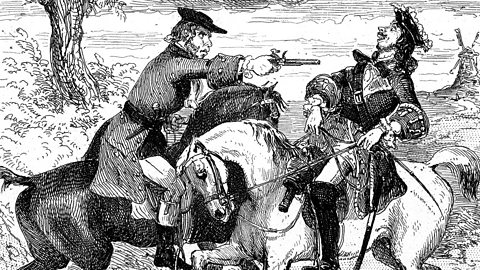Highway robbery and smuggling
Highway robbery
During the Industrial Revolution, foreign trade increased. Many of the goods produced in British factories were exported abroad.
Transport improved, through turnpike roads, canals and the development of the railway. These new forms of transport led to some new opportunities for crimes, such as highway robbery.

Illustration depicting Dick Turpin, an English highwayman (dated 18th century)
Highway robbery was a growing crime in the 18th century.
- There were more roads and more people travelling than in earlier centuries.
- Many of the roads went through open, isolated areas, where it was easy to rob people and then get away.
- After the end of the Napoleonic wars a lot of ex-soldiers struggled to find work, and so turned to highway robbery.
- Taverns or inns were dotted along the roads for travellers to stay. These gave the highway robbers opportunities to hide or sell their loot.
- Horses were cheap to buy and guns easy to get hold of thanks to the industrial and agricultural changes.
- The Industrial Revolution had led to merchants becoming rich. Often travellers would be carrying a lot of valuables on the roads as there were few banks at the time.
Smuggling

Smugglers, circa 1785
Smuggling is the illegal trade in goods to avoid paying customs duties and taxes. Merchants and businessmen had to pay:
- Excise Duty - a tax on goods made and consumed in a country. It was placed on tea, beer, cider, salt, leather and soap.
- Customs Duty - a tax on imported and exported goods.
Excise and Customs duties were high in the 18th century as the Government was trying to raise money to pay the cost of war with France.
Causes of the increase in the crime of smuggling
- Taxes and duties were increasing.
- Goods that were smuggled into the country could make a great deal of profit on the black market Illegal trading in goods..
- Smuggled goods were popular with people as they were usually cheaper than legally imported goods. People did not tend to see smuggling as a serious crime. Local people supported smuggling.
- There were thousands of miles of coastline in Britain, most of it unguarded and poorly policed.
- Smuggling was also quite exciting and was a quick way to make money.
- Investors - there were many who invested money in setting up smuggling gangs.